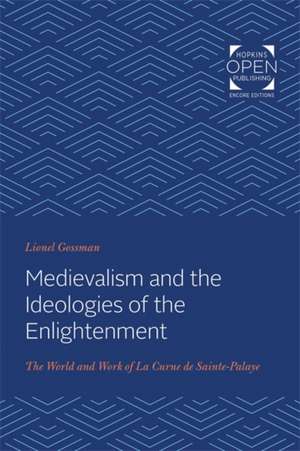Medievalism and the Ideologies of the Enlightenm – The World and Work of La Curne de Sainte–Palaye
Autor Lionel Gossmanen Limba Engleză Paperback – 13 ian 2020
Concentrating his investigation of Enlightenment medievalists on the most influential of them, La Curne de Sainte-Palaye, Gossman describes Sainte-Palaye's social and intellectual milieu and follows him in his relations with scholars and philosophes in France and abroad. Voltaire, Montesquieu, Gibbon, Walpole, Muratori, and Herder are some of the figures whose paths crossed that of Sainte-Palaye. Far from being opposed to philosophie, the medievalists were, Gossman argues, nourished at the same intellectual sources and shared many of the values of the philosophes. The existence of a close connection between medievalism and the Enlightenment is substantiated by the author's detailed analyses of Sainte-Palaye's work in the history, literature, and language of the French Middle Ages.
Although Sainte-Palaye had a surprising influence on the literature and historiography of both the eighteenth and nineteenth centuries--in France, England, and Germany--eighteenth-century medievalism, Gossman argues, is best understood not as anticipation of things to come but as part of a complex of ideas and feelings peculiar to the Enlightenment itself.
Preț: 287.40 lei
Preț vechi: 359.92 lei
-20% Nou
Puncte Express: 431
Preț estimativ în valută:
55.01€ • 56.69$ • 46.44£
55.01€ • 56.69$ • 46.44£
Carte indisponibilă temporar
Doresc să fiu notificat când acest titlu va fi disponibil:
Se trimite...
Preluare comenzi: 021 569.72.76
Specificații
ISBN-13: 9781421430447
ISBN-10: 1421430444
Pagini: 402
Dimensiuni: 152 x 229 x 24 mm
Greutate: 0.62 kg
Editura: Johns Hopkins University Press
ISBN-10: 1421430444
Pagini: 402
Dimensiuni: 152 x 229 x 24 mm
Greutate: 0.62 kg
Editura: Johns Hopkins University Press
Notă biografică
Lionel Gossman is a member of the Romance Languages Department at Johns Hopkins University.
Descriere
Although Sainte-Palaye had a surprising influence on the literature and historiography of both the eighteenth and nineteenth centuries-in France, England, and Germany-eighteenth-century medievalism, Gossman argues, is best understood not as anticipation of things to come but as part of a complex of ideas and feelings peculiar to the Enlightenment itself.
